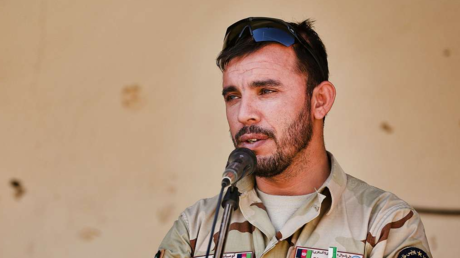
Kandahar police chief Abdul Raziq ordered kidnappings, torture, and executions, residents of the province allege
By backing a ruthless warlord in Afghanistan, the US enabled the abduction, torture, and murder of thousands of people, driving the Afghan population into the arms of the Taliban, according to a new New York Times feature published on Wednesday.
A militia leader who fought alongside US forces against the Taliban, Abdul Raziq, was hailed by American officials as a vital bulwark against the fundamentalists in their home province of Kandahar. General Austin Miller, at the time the top US officer in Afghanistan, described Raziq in 2018 as a “great friend” and “patriot.”
However, documents obtained by the New York Times link Raziq and his men to at least 368 proven kidnappings and dozens of extrajudicial killings, on top of thousands more that could not be verified.
The majority of these alleged abuses took place while Raziq commanded Kandahar’s US-backed police force from 2011 until 2018. American officials interviewed by the newspaper said they viewed Raziq as the only partner capable of suppressing the Taliban at a time when US President Barack Obama was sending tens of thousands of troops into Afghanistan in a bid to prevent the militants from retaking control of the country.
Instead of imposing law and order, Raziq and his men launched a campaign of brutal reprisals against anyone suspected of aiding the Taliban, and against members of the Noorzai tribe, rivals to his family’s Achakzai.
Combing through the US-backed government’s records, the New York Times found that almost 2,200 cases of disappearances had been reported to Kandahar authorities. Some 1,000 people told the newspaper that their loved ones had been kidnapped or killed by Raziq’s forces. A total of 368 cases were either documented or confirmed by two or more witnesses.
“These figures are almost certainly a gross undercount of the atrocities during Raziq’s reign,” the paper noted, explaining that while 2,200 cases were reported to the authorities, many government records were destroyed in 2021 before the Taliban returned to power, and many families likely never reported their relatives’ disappearances for fear of being targeted themselves.
“Only the American-backed government consistently engaged in forced disappearances in Kandahar,” the New York Times stated, citing former officials, combatants, and families of the missing.
Residents of Kandahar said they “came to detest the Afghan government and the Americans who propped it up,” the newspaper paraphrased. The Taliban reportedly took advantage of this resentment, using stories of Raziq’s brutality to recruit fighters and informants, which aided their eventual reconquest of Afghanistan in 2021.
“None of us supported the Taliban, at least not at first,” a man whose brother was abducted by Raziq’s police said. “But when the government collapsed, I ran through the streets, rejoicing.”
Raziq was shot dead by a Taliban assassin in 2018 as he walked alongside General Miller. In a statement released after the attack, Miller said “the good [Raziq] did for Afghanistan and the Afghan people cannot be undone.”




